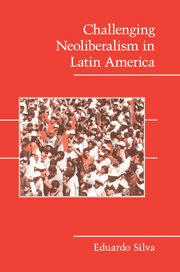Book contents
- Frontmatter
- Contents
- List of Tables
- Preface and Acknowledgments
- List of Acronyms
- 1 THE INCONVENIENT FACT OF ANTI-NEOLIBERAL MASS MOBILIZATION
- 2 CONTENTIOUS POLITICS, CONTEMPORARY MARKET SOCIETY, AND POWER
- 3 THE ARGUMENT: EXPLAINING EPISODES OF ANTI-NEOLIBERAL CONTENTION IN LATIN AMERICA
- 4 ARGENTINA
- 5 BOLIVIA
- 6 ECUADOR
- 7 VENEZUELA
- 8 PERU AND CHILE
- 9 CONCLUSION
- References
- Index
3 - THE ARGUMENT: EXPLAINING EPISODES OF ANTI-NEOLIBERAL CONTENTION IN LATIN AMERICA
Published online by Cambridge University Press: 05 June 2012
- Frontmatter
- Contents
- List of Tables
- Preface and Acknowledgments
- List of Acronyms
- 1 THE INCONVENIENT FACT OF ANTI-NEOLIBERAL MASS MOBILIZATION
- 2 CONTENTIOUS POLITICS, CONTEMPORARY MARKET SOCIETY, AND POWER
- 3 THE ARGUMENT: EXPLAINING EPISODES OF ANTI-NEOLIBERAL CONTENTION IN LATIN AMERICA
- 4 ARGENTINA
- 5 BOLIVIA
- 6 ECUADOR
- 7 VENEZUELA
- 8 PERU AND CHILE
- 9 CONCLUSION
- References
- Index
Summary
Why, at the turn of the 20th century, did Argentina, Bolivia, Ecuador, and Venezuela have episodes of anti-neoliberal popular mobilization that forced the collapse of pro-neoliberal governments and contributed to their eventual replacement with political forces interested in reforming neoliberalism? As seen in the previous chapter, the dismantlement of protections from the market for popular sectors (and middle classes) threatened significant economic and political exclusion. This was the first, and fundamental, necessary condition. In all of the cases, regardless of the degree to which neoliberal reforms were implemented, this generated the motivation – the grievances – for mobilization.
Because the construction of contemporary market society was an attempt to build an entire new social order – touted as modernization – it involved a comprehensive program of economic, political, and social reforms. Therefore, Polanyi-like defensive mobilization to challenge neoliberalism encompassed a wide variety of demands that, moreover, protest organizations consciously linked by tracing them back to neoliberalism's transformative project. Demands for economic and social reforms to neoliberalism focused on policies to protect individuals – or groups – from the full force of the market in the workplace, in education, and health care. Given widespread unemployment and underemployment, claim making extended to full employment policies and greater economic nationalism in the hopes of employment and to gain more control over investment and profits. Hence anti-neoliberal mobilization protested privatization, reduction of subsidies, and the dismantling of state economic development institutions.
- Type
- Chapter
- Information
- Challenging Neoliberalism in Latin America , pp. 43 - 55Publisher: Cambridge University PressPrint publication year: 2009

